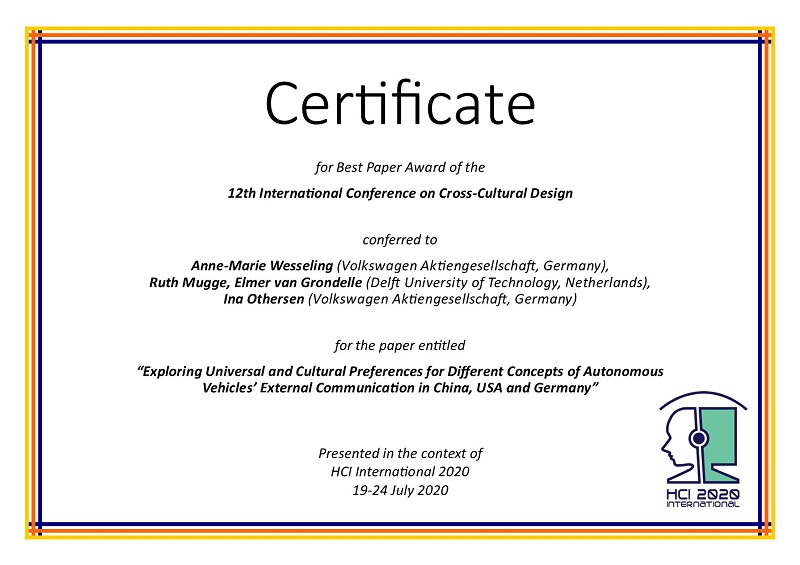
Certificate for Best Paper Award of the 12th International Conference on Cross-Cultural Design
The award has been conferred to
Anne-Marie Wesseling (Volkswagen Aktiengesellschaft, Germany),
Ruth Mugge, Elmer van Grondelle (Delft University of Technology, Netherlands),
Ina Othersen (Volkswagen Aktiengesellschaft, Germany)

Anne-Marie Wesseling
(presenter)
for the paper entitled
"Exploring Universal and Cultural Preferences for Different Concepts of Autonomous Vehicles’ External Communication in China, USA and Germany"
Presented in the context of
HCI International 2020
19-24 July 2020
Paper Abstract
"External communication constitutes a research area that has emerged from the need to develop an effective and intuitive system that enables autonomous vehicles (AVs) to communicate with all human road users. Considering that AVs generally target different countries, it is important to understand potential cultural differences in user preferences to various external communication concepts. This research investigates user preferences for seven external communication concepts using an online questionnaire (N = 710) in three diverse cultures (i.e. China, Germany and the United States of America). Specifically, the study explores the potential of the following concepts: Display, LED, emphasized inclination caused by vehicle behavior (“Incline”), Directed Sound Beam (“Sound”), Smart Assistant in Wearables, Smart infrastructure, and Augmented Reality. After seeing short movies of these concepts, participants rated the concepts on usability and trust. The findings demonstrate that opportunities exist for both universalization and localization. In addition, these results describe an opportunity for a modular external communication concept that consist of a baseline concept and cultural-specific modules. The baseline concept can be derived from universal preferences for external communication concepts. This baseline concept is to be extended with cultural-specific modules that aim to optimize usability and human understanding in specific cultures based on information preferences."
The full paper is available through SpringerLink, provided that you have proper access rights.